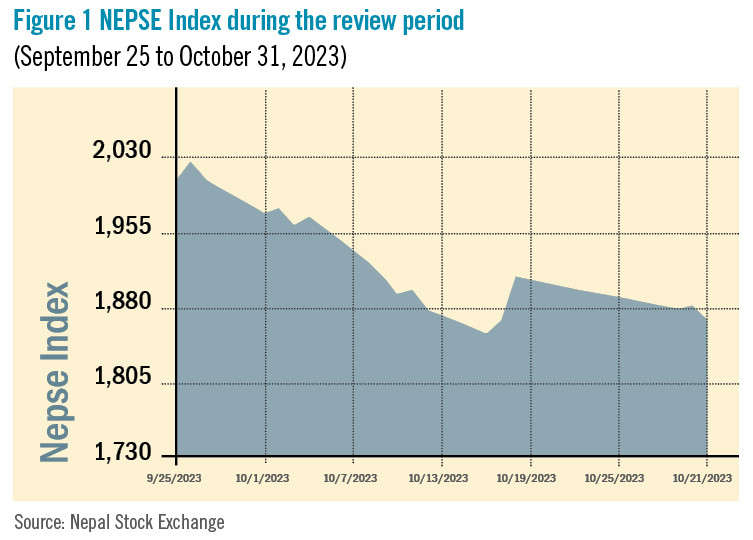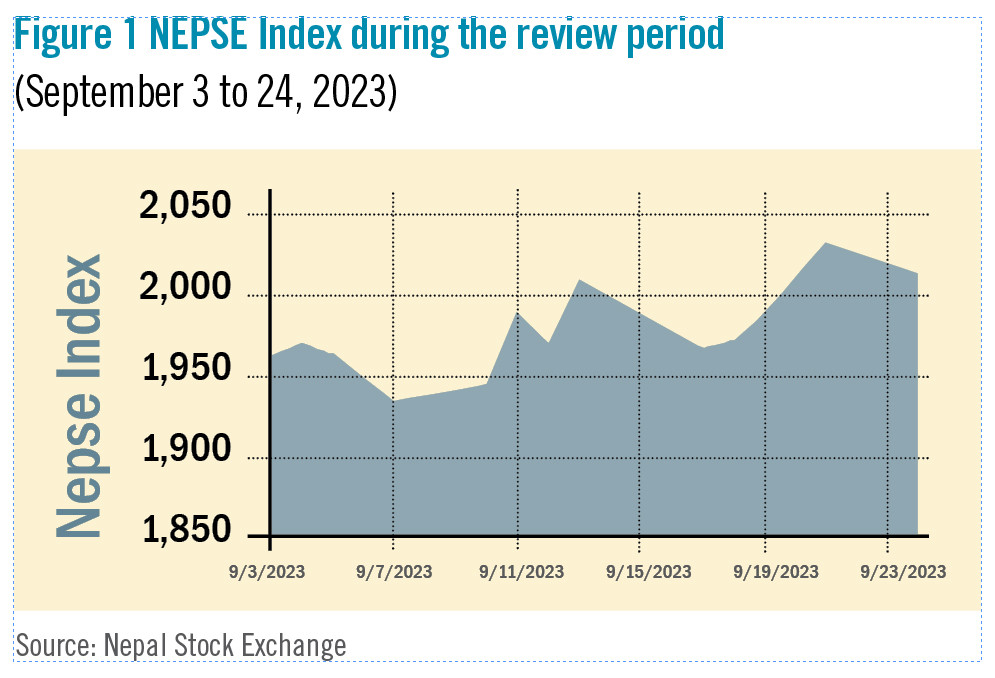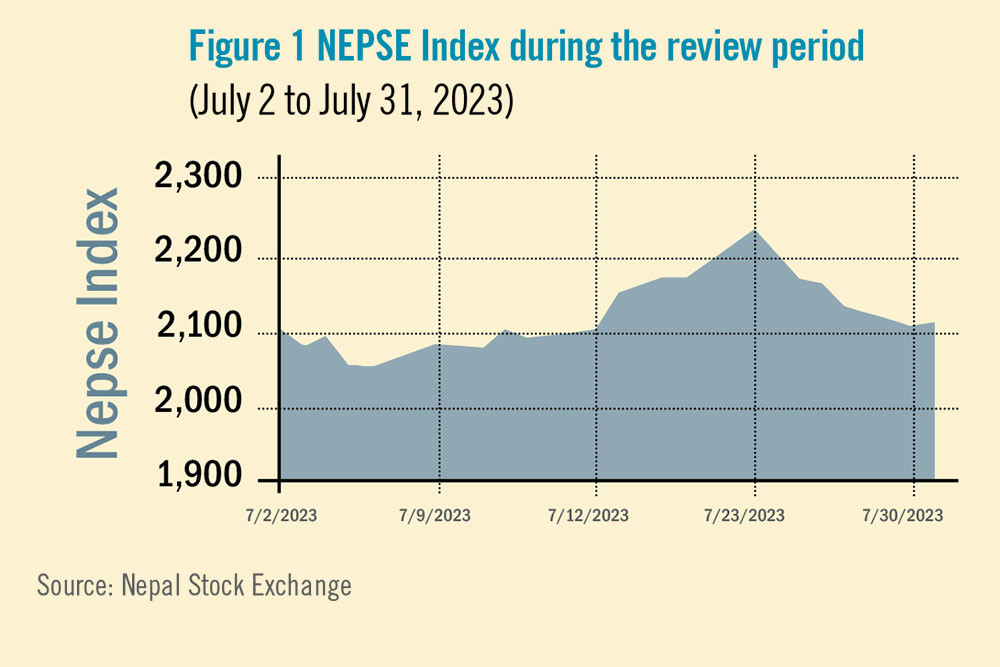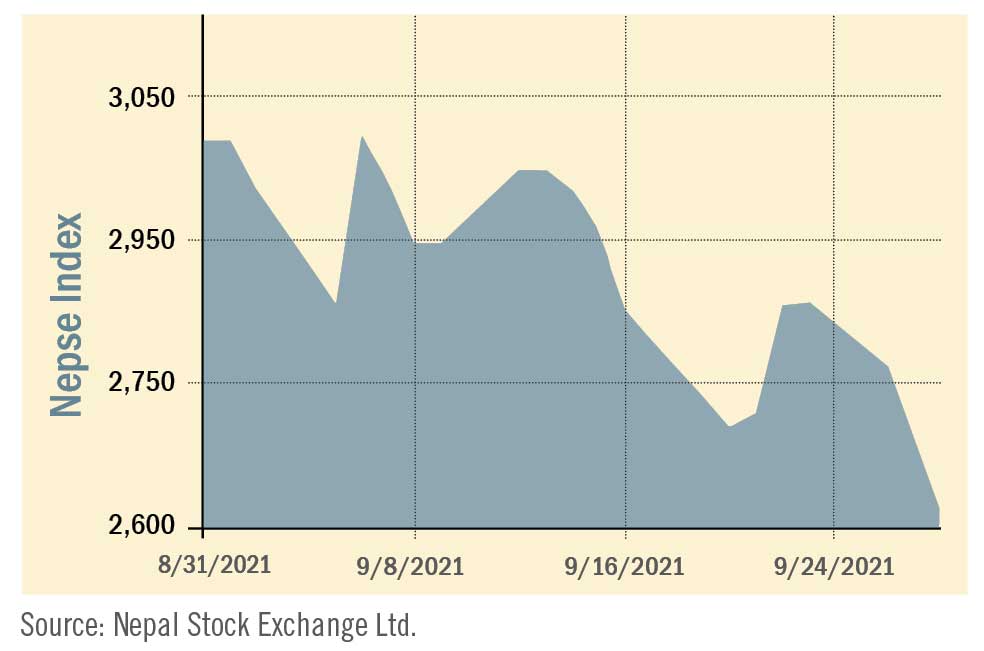
The Nepal Stock Exchange (NEPSE) index fell by 429.46 points (-14.10%) to end at 2,615.40 points during the review period of August 30 to September 28. The review period contrasted sharply with prior times when the benchmark index had broken new ground by surpassing 3,000 points. The major reason behind the current downfall has been attributed to the high selling pressure as the festive season of Dashain and Tihar are approaching and investors usually try to cover their festival expenses during this time of the year. Besides, the loan against shares limit of Rs 120 million set by the government has also caused investor morale to fall further. As a result, the total volume during the review period went down by 48.37% in comparison to an increase by 79.48% in the last review period, and stood at Rs 159.825 billion only.
During the review period, contrary to the previous review period, all of the sub-indices landed in the red zone. The Finance sub-index (-32.98%) was the biggest loser as share value of ICFC Finance (-Rs 446), Gurkhas Finance (-Rs 406) and Goodwill Finance (-Rs 359) went down. Hydropower sub-index (-22.52%) was second in line with decrease in the share value of Ngadi Hydropower (-Rs 362), Arun Valley Hydropower (-Rs 317) and Arun Kabeli (-Rs 311). Likewise, Development sub-index (-19.63%) followed suit with fall in the share value of Excel Development (-Rs 473), Corporate Development (-Rs 260), and Miteri Development (-Rs 202).
Non-life insurance sub-index (-19.63%) dropped as share value of Rastriya Beema Company (-Rs 2,554), Shikhar Insurance (-Rs 309) and NLG Insurance (-Rs 291) went down. Similarly, Life Insurance sub-index (-16.33%) also fell marginally with decrease in the share value of Life Insurance Company (-Rs 420), Nepal Life Insurance (-Rs 262) and National Life Insurance (-Rs 239). The Others sub-index (-16.13%) also witnessed a decrease in share prices of Citizen Investment Trust (-Rs 532) and Nepal Telecom (-Rs 172). Microfinance sub-index (-15.50%) was also on the losing side with fall in the share prices of National Microfinance (-Rs 624), Global IME Microfinance (-Rs 538) and Janauttan Samudayik Microfinance (-Rs 529).
Along the same lines, Hotels and Tourism sub-index (-11.96%) fell as share value of Oriental Hotel (-Rs 89), Taragaon Regency (-Rs 46) and Soaltee Hotel (-Rs 26) decreased. Manufacturing and Processing sub-index (-11.24%) subsided due to slack in the share prices of Bottlers Nepal (-Rs 516), Himalayan Distillery (-Rs 496) and Shivam Cements (-Rs 319). Likewise, Commercial Bank sub-index (-6.28%) also fell marginally with slump in the share value of NIC Asia Bank (-Rs 61), Kumari Bank (-Rs 59) and Agricultural Development Bank (-Rs 50).
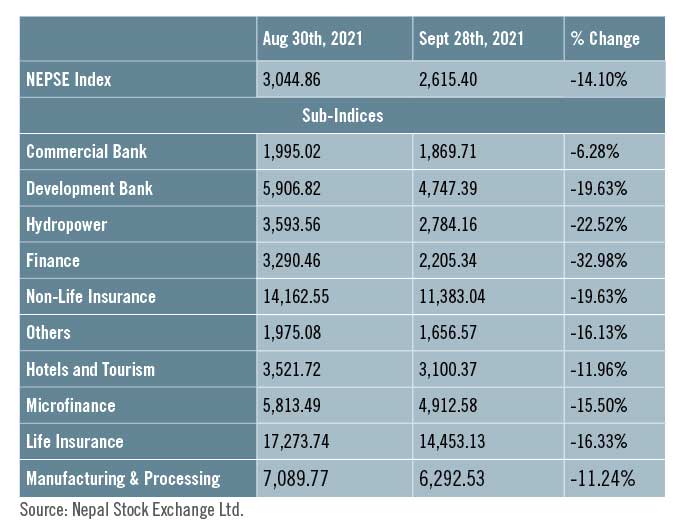

News and Highlights
Considering the impact of the recent Monetary Policy 2021/22 released by the Central Bank, the Share Market Reform Struggle Committee (Share Laganikarta Sangh Nepal) has advised the government, Nepal Rastra Bank, Securities Exchange Board of Nepal (SEBON) and Nepal Stock Exchange (NEPSE) to give special attention towards the measures of the Monetary Policy and the impact it can have on the secondary market. The association has submitted a memorandum to the Finance Minister demanding the removal of Rs 40 million and Rs 120 million margin loan limit and the CD ratio provision. The committee has suggested stakeholders consultations and reviews should be done regarding such limits as they believe that the stock market should not be regulated by such measures and that such limits should be removed. On the public issue front, SEBON has added the IPOs of Rapti Hydro and General Construction Company worth Rs 294 million to its pipeline. Siddhartha Capital has been appointed as its issue manager. Likewise, SEBON has also approved the issuance of right shares of Excel Development Bank worth Rs 243.33 million. NIBL Ace Capital has been appointed as the issue manager.Outlook
During the review period, the market saw its worst drop since the onset of the pandemic. Throughout the review period, investor confidence appeared to be poor. Aside from secondary market, investor activity in the primary market is continuing to dwindle. Low liquidity in the banking system, new policy measures, and market timing as key festivals approach are all contributing to the present selling pressure in the market. As the financial sector struggles with restricted liquidity and rising interest rates, the market’s future trajectory is expected to be volatile. This is an analysis from beed Management Pvt. Ltd. No expressed or implied warrant is made for usefulness or completeness of this information and no liability will be accepted for consequences of actions taken on the basis of this analysis.
Published Date: October 19, 2021, 12:00 am
Post Comment
E-Magazine
RELATED Beed Take


